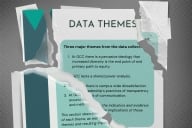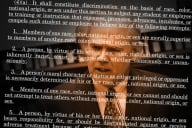You have /5 articles left.
Sign up for a free account or log in.
The death of Supreme Court Justice Antonin Scalia stunned legal and political observers -- and left many wondering about the possible impact on a pending U.S. Supreme Court case over affirmative action.
Many cases before the Supreme Court have the potential -- as long as there are only eight justices on the court -- to end in 4-4 ties. In such situations, the appeals court decision that brought the cases to the Supreme Court would stand. But in the current affirmative action case, Justice Elena Kagan has recused herself, so the seven remaining justices would produce a majority one way or the other. Many legal observers had been predicting a 5-3 decision barring or limiting the consideration of race in admissions, as all but three justices have expressed strong skepticism about government use of race.
Scalia's death would change that likely outcome to 4-3 and may give more hope to defenders of affirmative action that they could sway Justice Anthony Kennedy to either back the University of Texas at Austin, whose consideration of race is at issue in the case, or to favor only modest limitations on the consideration of race. But whichever way Justice Kennedy votes, a decision will have a majority behind it, and thus will count.
The case currently before the Supreme Court is Fisher v. University of Texas at Austin. Scalia's vote has not been in doubt, as he has consistently favored barring colleges from considering race in admissions.
During oral arguments in the case, in December, Scalia questioned the idea that being admitted to a top university might be helpful to all minority students -- in comments that angered many educators and minority students and scientists.
"There are those who contend that it does not benefit African-Americans to get them into the University of Texas, where they do not do well, as opposed to having them go to a less advanced school, a slower-track school where they do well. One of the briefs pointed out that most of the black scientists in this country don't come from schools like the University of Texas," he said.
Black scientists, he said, "come from lesser schools where they do not feel that they're being pushed ahead in classes that are too fast for them," he added. "I'm just not impressed by the fact that the University of Texas may have fewer [black students]," Scalia added. "Maybe it ought to have fewer. And maybe … when you take more, the number of blacks, really competent blacks admitted to lesser schools, turns out to be less. And I don't think it stands to reason that it's a good thing for the University of Texas to admit as many blacks as possible."
Other Cases
While the Fisher case is in the news today, Justice Scalia had a long history since joining the Supreme Court in 1986 of sharp words and strongly held views on issues that relate to higher education, including matters of race, gender equity and church and state. He was a reliable vote against affirmative action and for loosening bars on state support for religious activity or institutions. He didn't always win but is considered influential in that his ideas have frequently won support in a growing conservative legal movement that considers him a hero.
Some of the Scalia opinions over the years that have focused on higher education include the following:
Higher education desegregation and black colleges: In a 1992 ruling, the Supreme Court found in U.S. v. Fordice that Mississippi continued to maintain an unconstitutionally segregated higher education system, and the majority ruling faulted the state on differing admissions standards and missions for historically black and predominantly white institutions, and on duplicative programs at the two sets of institutions, which the court found perpetuated segregation.
In his opinion, Justice Scalia concurred with the finding that Mississippi was still segregated but dissented on the tests the Supreme Court set out for determining when a state has desegregated. Scalia wrote that the Supreme Court shouldn't apply the same standards to higher education -- or view racially identifiable historically black colleges are problematic.
"The constitutional evil of the 'separate but equal' regime that we confronted in Brown I was that blacks were told to go to one set of schools, whites to another. What made this 'even-handed' racial partitioning offensive to equal protection was its implicit stigmatization of minority students: to separate [black students] from others of similar age and qualifications solely because of their race generates a feeling of inferiority as to their status in the community that may affect their hearts and minds in a way unlikely ever to be undone," he wrote.
"In the context of higher education, a context in which students decide whether to attend school, and, if so, where, the only unconstitutional derivations of that bygone system are those that limit access on discriminatory bases; for only they have the potential to generate the harm Brown I condemned, and only they have the potential to deny students equal access to the best public education a state has to offer. Legacies of the dual system that permit (or even incidentally facilitate) free choice of racially identifiable schools -- while still assuring each individual student the right to attend whatever school he wishes -- do not have these consequences," he added.
Hate speech: In R.A.V. v. City of St. Paul in 1992, Justice Scalia wrote the majority decision striking down a St. Paul ordinance against hateful speech. While the case did not directly involve a college, the finding has influenced subsequent court rulings rejecting many limitations on speech at public colleges and universities.
In the decision, Scalia particularly took issue with the idea that a unit of government can say that some expressions -- which may cause offense based on a person's race, religion or gender, for example -- may be banned, while others may not.
"In its practical operation, moreover, the ordinance goes even beyond mere content discrimination to actual viewpoint discrimination. Displays containing some words -- odious racial epithets, for example -- would be prohibited to proponents of all views. But 'fighting words' that do not themselves invoke race, color, creed, religion or gender -- aspersions upon a person's mother, for example -- would seemingly be usable ad libitum in the placards of those arguing in favor of racial, color, etc. tolerance and equality, but could not be used by that speaker's opponents," Scalia wrote. "One could hold up a sign saying, for example, that all 'anti-Catholic bigots' are misbegotten; but not that all 'papists' are, for that would insult and provoke violence 'on the basis of religion.' St. Paul has no such authority to license one side of a debate to fight freestyle, while requiring the other to follow Marquess of Queensbury Rules."
Public, single-sex higher education: When the Supreme Court ruled in 1996 in U.S. v. Virginia that it was unconstitutional for the state to deny women the right to enroll at the Virginia Military Institute, Scalia was the only justice to dissent.
He wrote that the citizens of Virginia should have the right to decide whether to exclude women from VMI. "Much of the court's opinion is devoted to deprecating the closed mindedness of our forebears with regard to women's education, and even with regard to the treatment of women in areas that have nothing to do with education," Scalia wrote.
"Closed minded they were -- as every age is, including our own, with regard to matters it cannot guess, because it simply does not consider them debatable. The virtue of a democratic system with a First Amendment is that it readily enables the people, over time, to be persuaded that what they took for granted is not so, and to change their laws accordingly. That system is destroyed if the smug assurances of each age are removed from the democratic process and written into the Constitution."
State scholarships for theology education: The years that Scalia has served on the Supreme Court have seen a far greater willingness of the court to permit state aid to go to religious students or institutions. But in 2004, the Supreme Court in Locke v. Davey found that Washington State was within its rights to ban participation in a student aid program for theology programs that were "devotional" or focused on advancing a particular faith. Justice Scalia was among two justices in dissent.
"When the state makes a public benefit generally available, that benefit becomes part of the baseline against which burdens on religion are measured; and when the state withholds that benefit from some individuals solely on the basis of religion, it violates the Free Exercise Clause no less than if it had imposed a special tax," Scalia wrote.








